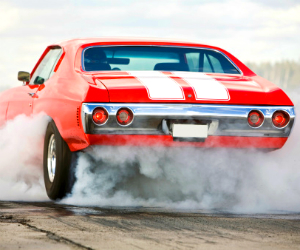Movies May Rev Up Teens’ Reckless Behavior Behind the Wheel
 Research has long shown that children’s behavior can be influenced by what they see in movies, TV, and video games. In light of this, the Motion Picture Association of America (MPAA) considers factors such as violence, sex, foul language, smoking, and drug use when assigning ratings for movies so that parents can make informed decisions about what their children watch.
Research has long shown that children’s behavior can be influenced by what they see in movies, TV, and video games. In light of this, the Motion Picture Association of America (MPAA) considers factors such as violence, sex, foul language, smoking, and drug use when assigning ratings for movies so that parents can make informed decisions about what their children watch.
A newly published study provides evidence indicating another on-screen behavior that could be added to this list: reckless driving. The study shows that children exposed to reckless driving in movies may end up emulating that behavior once they’re old enough to borrow the keys.
In fact, car crashes are the leading cause of death for teens in America, costing 2,650 lives in 2011 and leading to over 292,000 injuries according to the CDC.
A team of researchers led by psychological scientist Evelien Kostermans of Radboud University in the Netherlands surveyed 1,630 American adolescents over 6 years. The kids were 10 to 14 years old when they became involved and they were surveyed a total of five times over the course of the study. Each participant completed the final survey after she or he had had a full year of driving experience.
The researchers also analyzed top box office hits that were released in the 5 years prior to the baseline survey in 2003 for scenes of reckless driving. The adolescents were asked which of the movies they had seen out of a unique list of 50 movies drawn from the pool.
Additional survey questions measured potentially related factors, including adolescents’ sensation seeking and self-regulation behaviors, and variables such as socioeconomic status, daily television exposure, total movies watched per week, and the number of hours a day spent playing video or computer games.
By the final interview, the researchers surveyed the teens on their real life driving behavior. The researchers distinguished between intentional reckless driving behavior (for example, speeding and tailgating) and unintentionally dangerous behaviors that are due to inattention, like running a stop sign or failing to yield.
Sure enough, parents may want their kids to skip The Blues Brothers and Bullitt.
The researchers found that just as the glorification of smoking in movies is linked with children’s likelihood of smoking later on, exposure to reckless driving in film was associated with more dangerous behavior when the adolescents got behind the wheel.
“This study demonstrates a direct long-term relation between early exposure to reckless driving in movies and reckless driving behaviors among US adolescents with driving experience,” the researchers assert in the journal PLoS One.
Kostermans and colleagues did not find an association between film exposure and inattentive driving.
Interestingly, the researchers also found evidence of an indirect link between overall film exposure – number of movies watched per week – and later reckless driving behavior. The results indicate that greater film exposure is associated with higher levels of sensation seeking, which, in turn, is associated with reckless driving.
The researchers speculate that more overall screen exposure may have “stimulated reckless driving through exposure to a variety of other risk-taking behaviors such as excessive drinking, movie violence and their cumulative impact on sensation seeking tendencies.”
Based on these findings, Kostermans and colleagues argue that parents should be made aware of the potential effects that scenes of reckless driving may have on adolescents.
“Parents should understand that adolescents model behaviors they see in movies and should restrict children and adolescents in the number and types of movies they are allowed to watch each week,” they write.
Movie smoking and violence are incorporated into ratings systems while reckless driving is not— but researchers suggest that maybe it should be.
Reference
Kostermans, E., Stoolmiller, M., de Leeuw R.N.H., Engels, R.C.M.E., Sargent, J.D. (2014) Exposure to Movie Reckless Driving in Early Adolescence Predicts Reckless, but Not Inattentive Driving. PLoS ONE 9(12): e113927. doi:10.1371/journal.pone.0113927





APS regularly opens certain online articles for discussion on our website. Effective February 2021, you must be a logged-in APS member to post comments. By posting a comment, you agree to our Community Guidelines and the display of your profile information, including your name and affiliation. Any opinions, findings, conclusions, or recommendations present in article comments are those of the writers and do not necessarily reflect the views of APS or the article’s author. For more information, please see our Community Guidelines.
Please login with your APS account to comment.